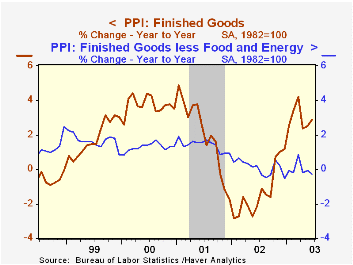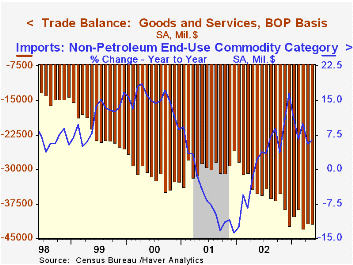 Global| Jul 11 2003
Global| Jul 11 2003Higher Energy Prices Raised The June PPI, Core Prices Fell
by:Tom Moeller
|in:Economy in Brief
Summary
Finished producer prices rose 0.5% in June, a bit more than Consensus expectations for a 0.3% gain. The rise was the first in three months. Finished energy prices jumped 3.4% for the first gain in three months. That accounted for [...]

Finished producer prices rose 0.5% in June, a bit more than Consensus expectations for a 0.3% gain. The rise was the first in three months.
Finished energy prices jumped 3.4% for the first gain in three months. That accounted for virtually all of the PPI's rise last month. Gasoline prices rose 5.5% (16.5% y/y) while fuel oil prices jumped 3.5% (23.7% y/y). Residential gas prices rose 3.0% and are up 35.5% y/y. These energy product price series are NSA.
Excluding food and energy, prices fell 0.1% for the third monthly decline this year. The core PPI is up 0.3% YTD.
Core finished consumer goods prices fell 0.1% (-0.5% y/y) for the third consecutive monthly drop. Passenger car prices fell 1.5% (-1.3% y/y). Prices for household appliances fell for the fourth month this year (-1.9% y/y) and home electronic equipment prices also fell (-2.2% y/y). Core consumer nondurable prices rose for the fourth month this year (-0.3% y/y). Capital goods prices dropped for the fourth month this year (0.0% y/y).
Intermediate goods prices rose by 0.5%, the first increase in three months. Energy prices led the gain, up 2.0%, but food prices rose a strong 1.9% (0.8% y/y). Less food & energy intermediate goods prices were unchanged.
Crude goods prices jumped 4.5% reflecting a 10.7% gain in energy prices. Core crude prices rose 0.6%, the first gain in four months. These prices are up 0.4% YTD.
| Producer Price Index | June | May | Y/Y | 2002 | 2001 | 2000 |
|---|---|---|---|---|---|---|
| Finished Goods | 0.5% | -0.3% | 2.9% | -1.3% | 2.0% | 3.7% |
| Core | -0.1% | 0.1% | -0.1% | 0.1% | 1.4% | 1.3% |
| Intermediate Goods | 0.5% | -0.8% | 4.5% | -1.5% | 0.4% | 4.9% |
| Core | 0.0% | -0.1% | 2.1% | -0.5% | -0.1% | 2.6% |
| Crude Goods | 4.5% | 1.7% | 29.5% | -10.6% | 0.3% | 22.8% |
| Core | 0.6% | -1.9% | 4.9% | 3.8% | -10.0% | 7.4% |
by Tom Moeller July 11, 2003

The U.S. foreign trade deficit in May remained near the record level at $41.8B. That was about stable with an April deficit that was revised slightly shallower. Consensus expectations were for a deficit of $41.5B.
For the first five months of this year, the trade deficit averaged a $492.2B annual rate.
Imports rose 0.7% in May as a decline in the value of petroleum product imports was offset by higher imports of capital goods (+3.0% y/y) and autos (+3.8% y/y).
The quantity of crude petroleum imports rose 1.9% (8.1% y/y) but the average price fell 7.3% to $24.11, about even with last May.
Exports rose 0.9% and are up slightly YTD. Exports of capital goods rose 1.3%, up 3.8% YTD.
A report from the Federal Reserve Bank of St. Louis titled "World Trade: Past, Present, and Future" can be found here.
| Foreign Trade | May | April | Y/Y | 2002 | 2001 | 2000 |
|---|---|---|---|---|---|---|
| Trade Deficit | $41.8B | $41.6B | $35.1B(5/02) | $418.0B | $357.8B | $375.4B |
| Exports - Goods & Services | 0.9% | -1.8% | 1.2% | -3.3% | -5.8% | 11.8% |
| Imports - Goods & Services | 0.7% | -2.2% | 6.7% | 2.0% | -5.5% | 18.5% |
Tom Moeller
AuthorMore in Author Profile »Prior to joining Haver Analytics in 2000, Mr. Moeller worked as the Economist at Chancellor Capital Management from 1985 to 1999. There, he developed comprehensive economic forecasts and interpreted economic data for equity and fixed income portfolio managers. Also at Chancellor, Mr. Moeller worked as an equity analyst and was responsible for researching and rating companies in the economically sensitive automobile and housing industries for investment in Chancellor’s equity portfolio. Prior to joining Chancellor, Mr. Moeller was an Economist at Citibank from 1979 to 1984. He also analyzed pricing behavior in the metals industry for the Council on Wage and Price Stability in Washington, D.C. In 1999, Mr. Moeller received the award for most accurate forecast from the Forecasters' Club of New York. From 1990 to 1992 he was President of the New York Association for Business Economists. Mr. Moeller earned an M.B.A. in Finance from Fordham University, where he graduated in 1987. He holds a Bachelor of Arts in Economics from George Washington University.






